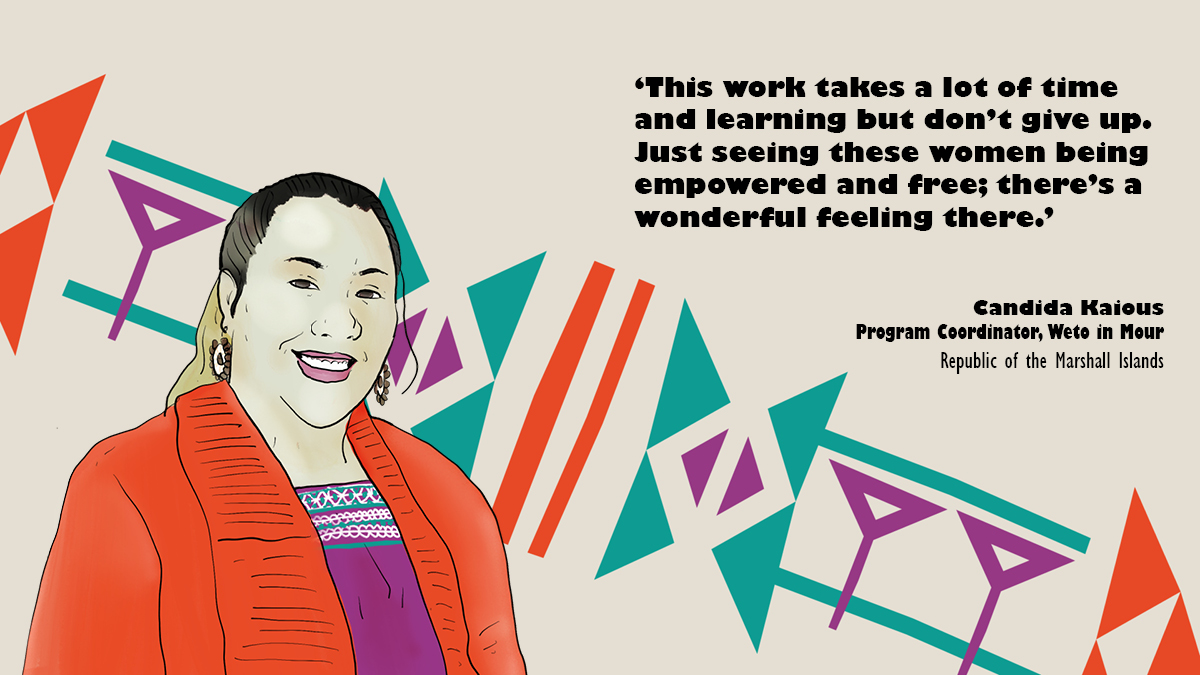
To celebrate women in the Pacific we're sharing a series of Herstories of women and women's movements who have collectively struggled, lobbied, stood in solidarity and supported each other and survivors of violence against women, and triumphed. This is a story of Candida Kaious a woman leader who is the Project Coordinator of Weto in Mour at the Women United Together Marshall Islands (WUTMI).
Candida Kaious is Weto in Mour’s (WiM) Program Coordinator. She joined the service, which provides counselling and support to survivors of violence against women and girls in the Republic of the Marshall Islands (RMI) in 2016.
Candida fell into the work by chance, having recently graduated from Marshall Islands College after three years spent teaching primary school . She had gone back to college in the hopes of securing a better paying job to support her young family. Candida initially joined WiM in a part-time role but quickly became passionate about her job – even turning down a better-paying government role as a data entry clerk.
“The more I learned about gender-based violence and gender inequality, and how our culture and beliefs are linked to violence, I then realised there needs to be change. I also realised that I need to change and that I want to give back to the community,” she said.
“That’s what made me stick with this work. Since then, I have changed how I think about gender differences, such as how people think they should behave and dress. It was not easy but I have tried hard have made a breakthrough.”
Candida joined WiM along with four other women, all in their thirties, and together they helped launch the country’s very first counselling service for survivors of violence against women and girls with funding and technical support from the Australian Government. This support continues through Pacific Women Lead, and formerly through Pacific Women Shaping Pacific Development (Pacific Women).
None of the women had prior knowledge about gender-based violence and the law so there was a steep learning curve. Besides learning on the job, they have benefited from working alongside Marshall Islands women’s rights pioneers like Daisy Alik Momotaro and Marie Maddison at WiM’s parent organisation Women United Together Marshall Islands (WUTMI).
Candida says there are number of challenges in WiM’s work including the widely held belief that their work was somehow anti-culture, anti-religion and anti-men - stereotypes they continue to work hard to overcome.
“When the program was new, people were saying that we were going was against our men, that we are trying to destroy our culture and customs. That what we were doing went against the bible. Through training, we’ve learned to provide appropriate culture-based responses.”
She and her fellow caseworkers employ Marshallese sayings that translate to ‘mothers as caretakers’ and ‘men’s need to protect mothers’ alongside contemporary readings of the bible to make the case for greater equality between women and men.
Candida has taken the time to talk about gender with her father, a pastor, and her husband who previously had traditional ideas about men and women’s roles. Today, they’re both proud and supportive of her work.
By leading a team of women her own age, she has acquired leadership skills.
“I’ve learned to be supportive and lead through example,’ she said.
“And not to think we can do everything ourselves. We need others to get things done.”
To young women leaders doing similar work in the region, she says it is worth sticking it out.
‘This work takes a lot of time and learning but don’t give up. Just seeing these women being empowered and free; there’s a wonderful feeling there.’[1]
ENDS
Read More:
- Photo book: 'We Don't Whisper Anymore' photo book of Herstories, including a summary version of Candida's Herstory
-
- Photo book of Herstories in an e-flipbook version



